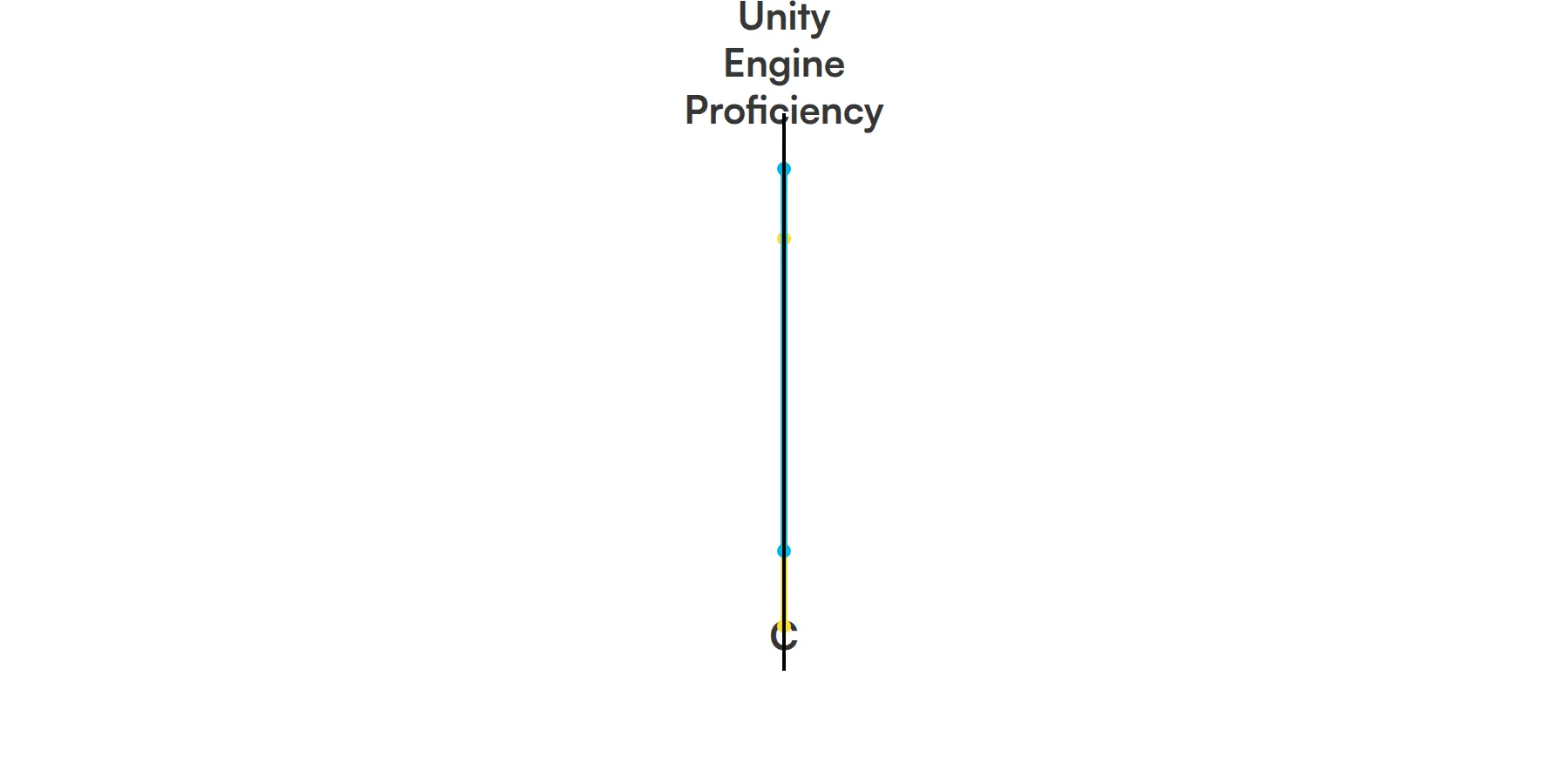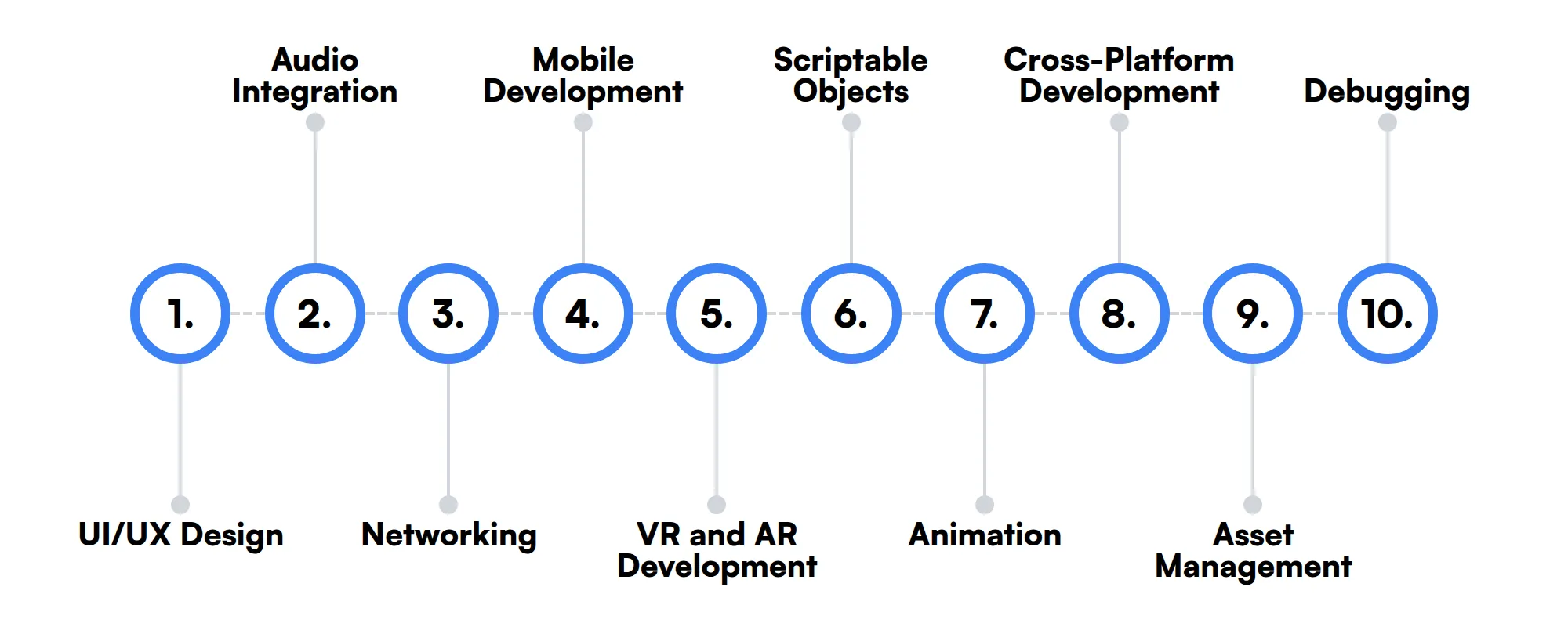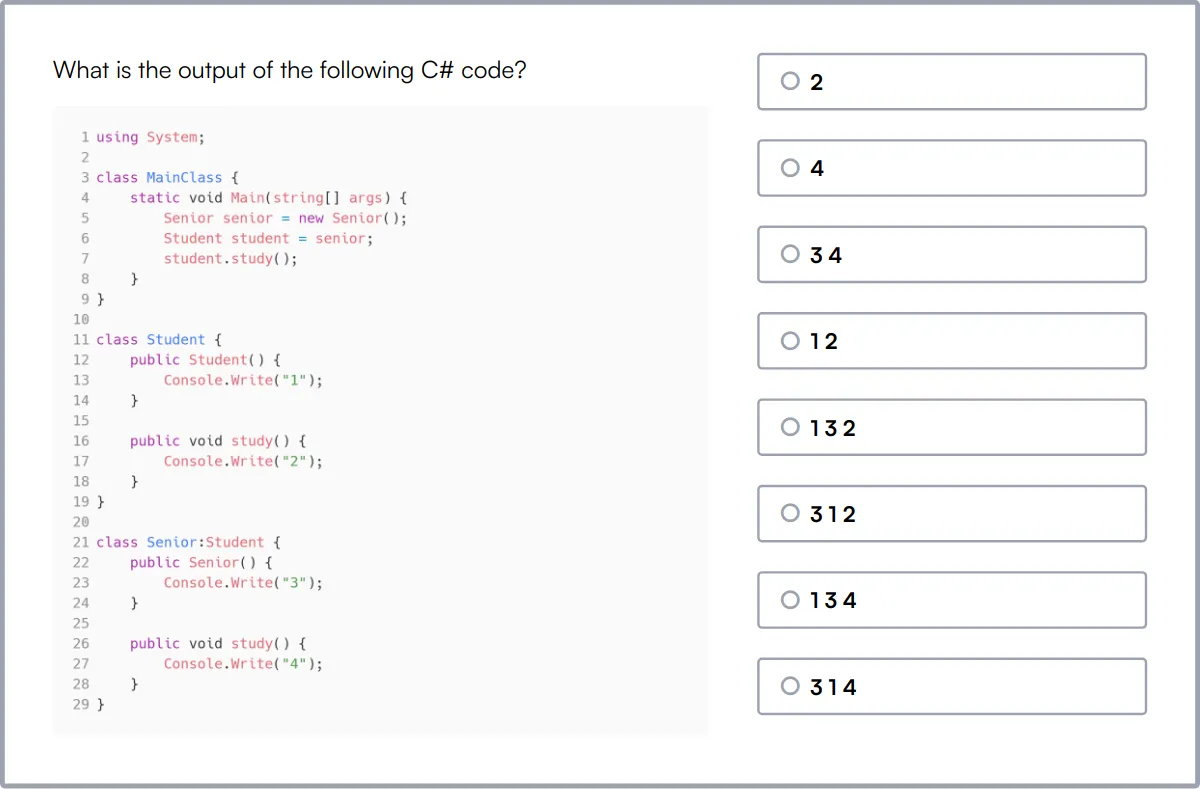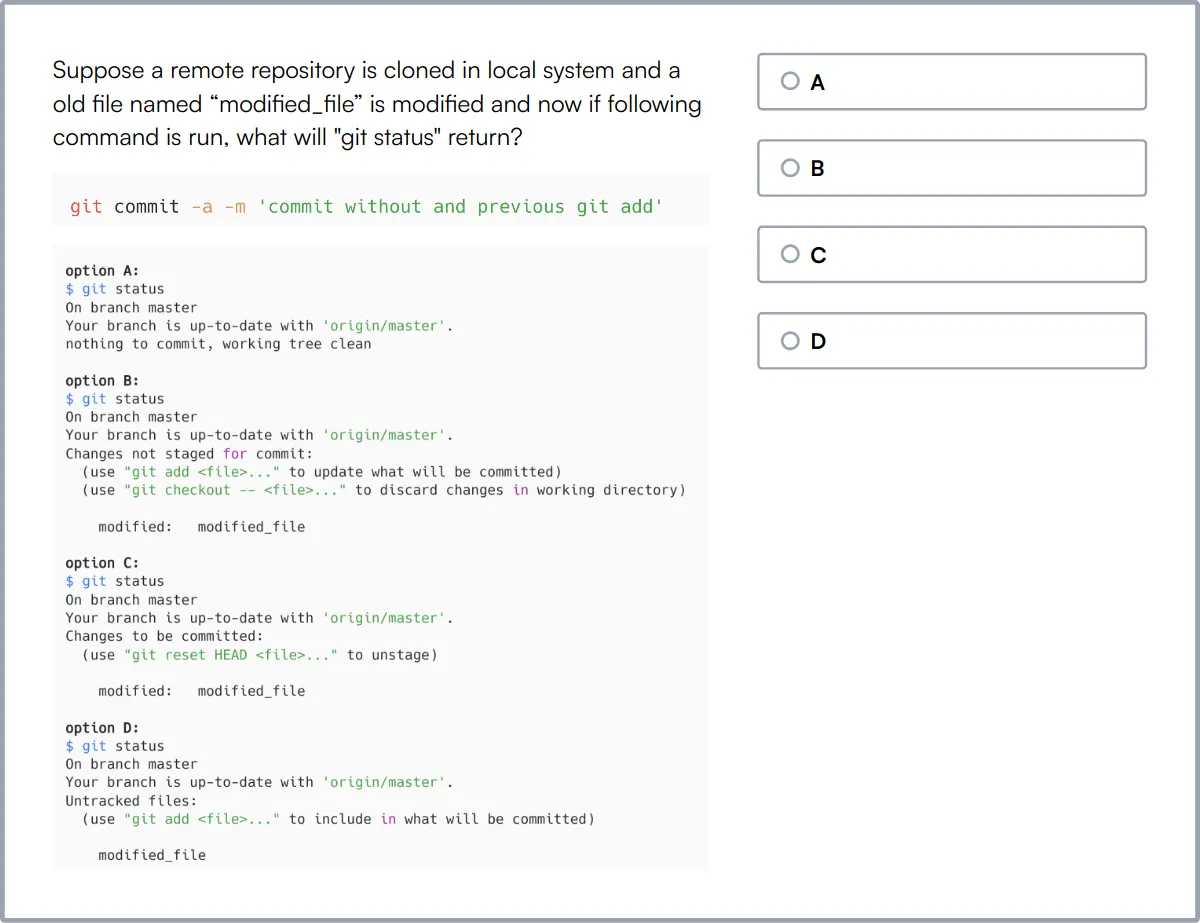Unity developers are the architects of interactive experiences, crafting immersive worlds and engaging gameplay. They bring ideas to life through 3D environments and interactive elements, making them a key component in the game development process.
Skills for Unity developers include proficiency in the Unity engine, C# programming, and a strong understanding of game design principles. Additionally, they need to possess problem-solving abilities and effective communication skills to collaborate with other team members.
Candidates can write these abilities in their resumes, but you can’t verify them without on-the-job Unity Developer skill tests.
In this post, we will explore 8 essential Unity Developer skills, 10 secondary skills and how to assess them so you can make informed hiring decisions.
Table of contents
8 fundamental Unity Developer skills and traits
The best skills for Unity Developers include Unity Engine Proficiency, C# Programming, 3D Mathematics, Physics Simulation, AI Programming, Shader Development, Performance Optimization and Version Control.
Let’s dive into the details by examining the 8 essential skills of a Unity Developer.

Unity Engine Proficiency
A Unity Developer must have a deep understanding of the Unity Engine, including its interface and scripting APIs. This skill is fundamental for creating and optimizing interactive applications and games, allowing the developer to implement features and enhancements effectively.
Check out our guide for a comprehensive list of interview questions.
C# Programming
C# is the primary programming language used in Unity for scripting. Mastery of C# enables a Unity Developer to write clean and efficient code that drives game mechanics and interactions, crucial for developing engaging user experiences.
3D Mathematics
Knowledge of vector math, geometry, and linear algebra is essential for a Unity Developer. This skill is used to manipulate game objects, control camera dynamics, and ensure accurate physics simulations, all of which are integral to game development.
Physics Simulation
Understanding physics engines and being able to implement realistic physics behavior in games is a key skill for a Unity Developer. This involves using Unity’s built-in physics components to create believable and immersive environments.
AI Programming
Artificial Intelligence programming involves creating intelligent behaviors and decision-making processes for non-player characters in games. A Unity Developer uses this skill to enhance the interactivity and complexity of game environments.
Shader Development
Shaders control the visual appearance of scenes in Unity. A Unity Developer must be skilled in writing and optimizing shaders to enhance the visual fidelity of games while maintaining performance across different devices.
Performance Optimization
Optimizing game performance to ensure smooth operation across various hardware is critical. A Unity Developer uses profiling tools and efficient coding practices to minimize resource consumption and enhance user experience.
Version Control
Familiarity with version control systems like Git is necessary for a Unity Developer to manage changes and collaborate effectively with other team members on projects, ensuring a streamlined and error-free development process.
10 secondary Unity Developer skills and traits
The best skills for Unity Developers include UI/UX Design, Audio Integration, Networking, Mobile Development, VR and AR Development, Scriptable Objects, Animation, Cross-Platform Development, Asset Management and Debugging.
Let’s dive into the details by examining the 10 secondary skills of a Unity Developer.

UI/UX Design
While not primarily their role, having a good grasp of user interface and user experience design can help a Unity Developer create more intuitive and engaging interfaces.
Audio Integration
Integrating and manipulating audio files effectively can greatly enhance the atmosphere and immersion of games, a useful skill for any Unity Developer.
Networking
Skills in networking are important for developing multiplayer games, where a Unity Developer needs to ensure smooth data transmission and synchronization between players.
Mobile Development
Understanding the specifics of mobile platforms and how to optimize games for mobile devices is beneficial for a Unity Developer, as the mobile gaming market continues to grow.
VR and AR Development
With the rise of virtual and augmented reality, skills in VR and AR development are increasingly valuable for Unity Developers working on cutting-edge projects.
Scriptable Objects
Using scriptable objects for data management and game settings can help Unity Developers maintain cleaner code and easier scalability in their projects.
Animation
Basic knowledge of animation techniques and tools within Unity can aid a Unity Developer in bringing characters and scenes to life, adding depth to the game's storytelling.
Cross-Platform Development
Understanding how to develop applications that run seamlessly on various platforms ensures that a Unity Developer can reach a wider audience.
Asset Management
Efficient management of game assets, including textures, models, and animations, is crucial for keeping projects organized and ensuring optimal runtime performance.
Debugging
Strong debugging skills allow a Unity Developer to quickly identify and fix issues that may arise during development, ensuring a stable final product.
How to assess Unity Developer skills and traits
Assessing the skills and traits of a Unity Developer can be a challenging task, given the diverse range of expertise required in this field. From mastering the Unity Engine and C# programming to understanding 3D mathematics and physics simulation, a Unity Developer's skill set is both broad and deep. It's not just about knowing the tools; it's about how effectively a developer can apply them to create engaging and optimized experiences.
Traditional resumes might highlight a candidate's experience and education, but they often fall short in demonstrating actual proficiency and problem-solving abilities. This is where skills-based assessments come into play. By focusing on real-world scenarios and tasks, these assessments provide a clearer picture of a candidate's capabilities. Adaface on-the-job skill tests are designed to help you identify top talent, offering a 2x improved quality of hires and an 85% reduction in screening time.
Let’s look at how to assess Unity Developer skills with these 4 talent assessments.
Unity Test
Our Unity Test evaluates a candidate's proficiency in developing games and applications using the Unity engine. It assesses knowledge of Unity's core features, C# scripting, 2D/3D development, UI systems, physics, animation, asset management, and optimization techniques.
The test covers Unity Game Engine Basics, C# Scripting in Unity, 2D and 3D Game Development, and Unity UI System. It includes both MCQs and coding questions to evaluate theoretical understanding and practical skills in Unity development.
Successful candidates demonstrate a strong grasp of Unity's physics engine, animation and particle systems, and scene management. They also show proficiency in Unity's audio system, lighting and rendering, and networking capabilities.

C# Online Test
Our C# Online Test evaluates candidates on their understanding of C# basics, OOP concepts, and efficient C# usage. It also assesses their ability to scale C# programs using asynchronous programming.
The test includes scenario-based MCQs that cover C# Basics, OOP concepts like inheritance and polymorphism, and Error/Exception Handling. It also evaluates knowledge of Garbage Collector and Memory footprint and C# Multithreading.
High-scoring candidates show proficiency in structural and creational design patterns and demonstrate the ability to handle C# networking tasks effectively.
Economics Test
Our Economics Test evaluates candidates' knowledge and understanding of economic principles, data interpretation, and financial analysis. It assesses their ability to apply economic concepts to real-world scenarios.
The test covers Economics, Data Interpretation, and Business Analysis. It includes questions on Macro-economics and Micro-economics, assessing the ability to make data-backed decisions.
Candidates who perform well demonstrate strong analytical skills and the ability to interpret complex economic data effectively.
Git Online Test
Our Git Online Test evaluates candidates on their understanding of Git, a popular version control system. It assesses knowledge of basic and advanced Git commands and proficiency in using Git to manage source code.
The test includes scenario-based MCQs covering Git basics, Branching and Merging, Conflict Resolution, and Remote Repositories. It also evaluates knowledge of Git Workflows and Branching Models.
Candidates who excel in this test demonstrate a strong understanding of Git commands and concepts, and the ability to resolve conflicts and manage repositories effectively.

Summary: The 8 key Unity Developer skills and how to test for them
| Unity Developer skill | How to assess them |
|---|---|
| 1. Unity Engine Proficiency | Evaluate candidate's ability to navigate and utilize Unity's features effectively. |
| 2. C# Programming | Assess understanding and application of C# concepts in Unity development. |
| 3. 3D Mathematics | Test knowledge of vectors, matrices, and geometry in 3D space. |
| 4. Physics Simulation | Review ability to implement realistic physics behaviors in Unity. |
| 5. AI Programming | Check proficiency in creating intelligent behaviors and decision-making systems. |
| 6. Shader Development | Gauge skills in writing and optimizing shaders for visual effects. |
| 7. Performance Optimization | Determine ability to enhance and maintain efficient game performance. |
| 8. Version Control | Examine experience with managing code changes and collaboration. |
Unity Test
Unity Developer skills FAQs
How can I assess a candidate's proficiency with the Unity Engine?
Ask candidates to showcase a portfolio of projects they've developed using Unity. Look for diversity in project types and complexity. Consider a practical test where they build a simple game or feature.
What should I look for in a Unity Developer's C# programming skills?
Evaluate their understanding of object-oriented programming, familiarity with Unity's API, and ability to write clean, maintainable code. Code reviews or pair programming sessions can be insightful.
Why is 3D mathematics important for Unity Developers?
3D mathematics is crucial for tasks like object transformations, camera control, and physics simulations. Assess their knowledge through problem-solving questions or practical tests involving vector and matrix operations.
How do I evaluate a candidate's ability in performance optimization?
Discuss their experience with profiling tools and techniques for reducing draw calls, optimizing scripts, and managing memory. Ask for examples of past performance challenges they've solved.
What role does version control play in Unity development?
Version control is key for collaboration and project management. Ensure candidates are comfortable with systems like Git, and ask about their experience in managing branches and resolving conflicts.
How can I test a candidate's skills in VR and AR development?
Inquire about their experience with VR/AR SDKs and platforms. A practical test involving a simple VR/AR application can reveal their understanding of spatial interactions and user experience design.
What is the significance of scriptable objects in Unity?
Scriptable objects are used for data management and reducing memory usage. Ask candidates to explain their use cases and benefits, or to demonstrate their implementation in a project.
How important is debugging in Unity development?
Debugging is essential for identifying and fixing issues. Evaluate candidates' problem-solving skills by discussing common Unity bugs and their approach to troubleshooting and resolving them.

40 min skill tests.
No trick questions.
Accurate shortlisting.
We make it easy for you to find the best candidates in your pipeline with a 40 min skills test.
Try for freeRelated posts



